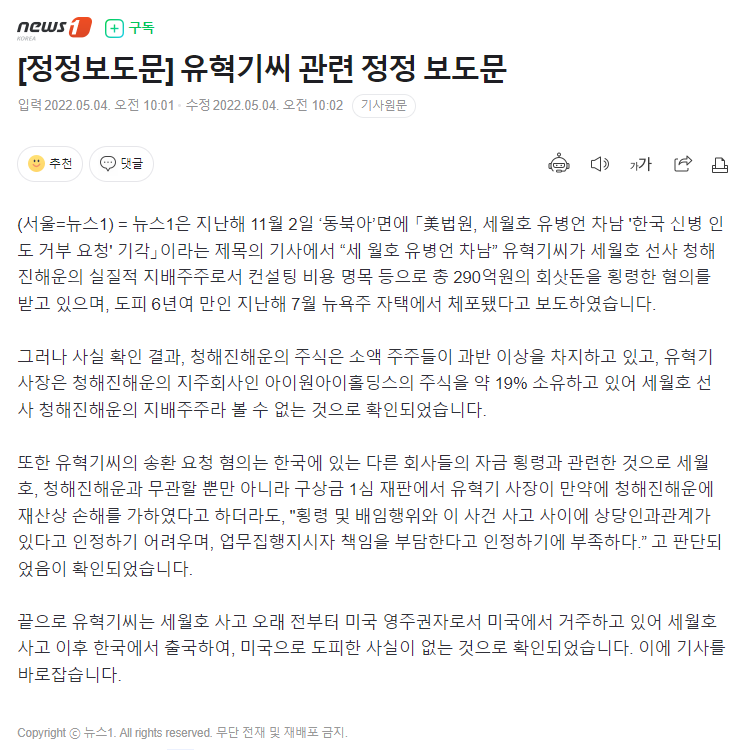[유혁기] 미국 법원이 유혁기 씨에 대하여 '한국 송환 결정'을 내렸다?
Author : -관리자- / Date : 2022. 6. 2. 14:41 / Category : MEDIA/정정보도 모음
1. 무엇이 오보인가?
'미 법원이 유혁기 씨에 대하여 '한국 송환 결정'을 내렸다', '차남 유혁기 씨는 세월호 운영 선박회사인 청해진해운의 횡령 혐의를 받았다.', '차남 유혁기 씨는 2014년 검찰의 출석요구에도 불응하고 도피하여 지내다가 체포되었다' 라는 등 유병언 전 회장의 차남 유혁기씨에 대해 다수 언론사에서 오보를 냈다. 그러나 해당 내용은 과거 언론보도 및 근거사실이 아니다.
2. 보도 VS 사실
1. 차남 유혁기 씨는 세월호 운영 선박회사인 청해진해운의 횡령 혐의를 받았다. 2. 차남 유혁기 씨는 2014년 검찰의 3차례 출석요구에도 불응하고 도피하여 지내다가 체포되었다 3. 미 법원이 유혁기 씨에 대하여 '한국 송환 결정'을 내렸다 4. 유혁기씨는 세월호 선사 청해진해운의 실질적 지배 주주이다. |
| ▼ |
1. 유혁기씨의 송환 요청 혐의는 한국에 있는 다른 회사들의 자금 횡령과 관련한 것이며, 세월호, 청해진해운과 무관하다. 뿐만 아니라 구상금 1심 재판에서 유혁기 사장에 대하여 "만약에 청해진해운에 재산상 손해를 가하였다고 하더라도, 횡령 및 배임행위의 내용, 시기, 청해진해운의 규모 등에 비추어 볼 때, 위와 같은 횡령 및 배임행위와 이 사건 사고 사이에 상당인과관계가 있다고 인정하기 어려우며, 유혁기의 구체적인 위반 행위에 관한 주장. 입증이 제출되지 않은 점 등에 비추어 유혁기가 이 사건 사고에 대하여 업무집행지시자 책임을 부담한다고 인정하기에 부족하다."고 판결했다. 2. 검찰은 해외에 체류하고 있는 유혁기 씨에게 3차례 자진 출석 요구를 했다고 알려졌으나, 사고 직후 유 전 회장의 입장을 밝힌 적이 있는 손병기 씨에게만 연락했을 뿐 당사자에게는 직접 연락을 취한 사실이 없다. 그러나 손병기 씨는 정식으로 유병언 전 회장이나 유혁기 씨로부터 사건을 수임을 받은 사실이 없으며 정식으로 선임한 변호사가 아니었다. 유혁기 씨는 세월호 사고 오래 전부터 미국 영주권자로서 미국에서 거주하고 있어 세월호 사고 이후 한국에서 출국하여, 미국으로 도피한 사실이 없다. 3. 미국 법원은 유혁기 씨에 대한 한국 정부의 송환 요청에 대하여 7개 혐의가 범죄인 인도에 해당한다고는 하였으나, 공소시효에 관하여 최종적으로 결정을 내리지 못하고 국무부가 결정할 일이라며 최종 판단을 국무부에 넘겼다. 따라서 미 법원이 유혁기 씨에 대하여 한국으로 송환하라고 결정했다는 내용은 사실이 아니다. 4. 유혁기 사장은 청해진해운의 지주회사인 아이원아이홀딩스의 주식을 약 19% 소유하고 있다. 따라서 세월호 선사 청해진해운의 지배주주라 볼 수 없으며 소액 주주들이 과반 이상을 차지하고 있다. |
3. 관련 정정 및 반론보도
<뉴스1 2022년 5월 4일>

뉴스1은 지난해 11월 2일 ‘동북아’면에 「美법원, 세월호 유병언 차남 '한국 신병 인도 거부 요청' 기각」이라는 제목의 기사에서 “세 월호 유병언 차남” 유혁기씨가 세월호 선사 청해진해운의 실질적 지배주주로서 컨설팅 비용 명목 등으로 총 290억원의 회삿돈을 횡령한 혐의를 받고 있으며, 도피 6년여 만인 지난해 7월 뉴욕주 자택에서 체포됐다고 보도하였습니다. 그러나 사실 확인 결과, 청해진해운의 주식은 소액 주주들이 과반 이상을 차지하고 있고, 유혁기 사장은 청해진해운의 지주회사인 아이원아이홀딩스의 주식을 약 19% 소유하고 있어 세월호 선사 청해진해운의 지배주주라 볼 수 없는 것으로 확인되었습니다. 또한 유혁기씨의 송환 요청 혐의는 한국에 있는 다른 회사들의 자금 횡령과 관련한 것으로 세월호, 청해진해운과 무관할 뿐만 아니라 구상금 1심 재판에서 유혁기 사장이 만약에 청해진해운에 재산상 손해를 가하였다고 하더라도, "횡령 및 배임행위와 이 사건 사고 사이에 상당인과관계가 있다고 인정하기 어려우며, 업무집행지시자 책임을 부담한다고 인정하기에 부족하다.” 고 판단되었음이 확인되었습니다. 끝으로 유혁기씨는 세월호 사고 오래 전부터 미국 영주권자로서 미국에서 거주하고 있어 세월호 사고 이후 한국에서 출국하여, 미국으로 도피한 사실이 없는 것으로 확인되었습니다. 이에 기사를 바로잡습니다.
본 게시글은 지난 2014년 4월 중순부터 2016년 10월 말까지 310여 곳의 언론사들이 보도한
16,000여 건의 오보에 대한 정정 및 반론 보도 중에 해당 부분을 발췌한 글입니다.
